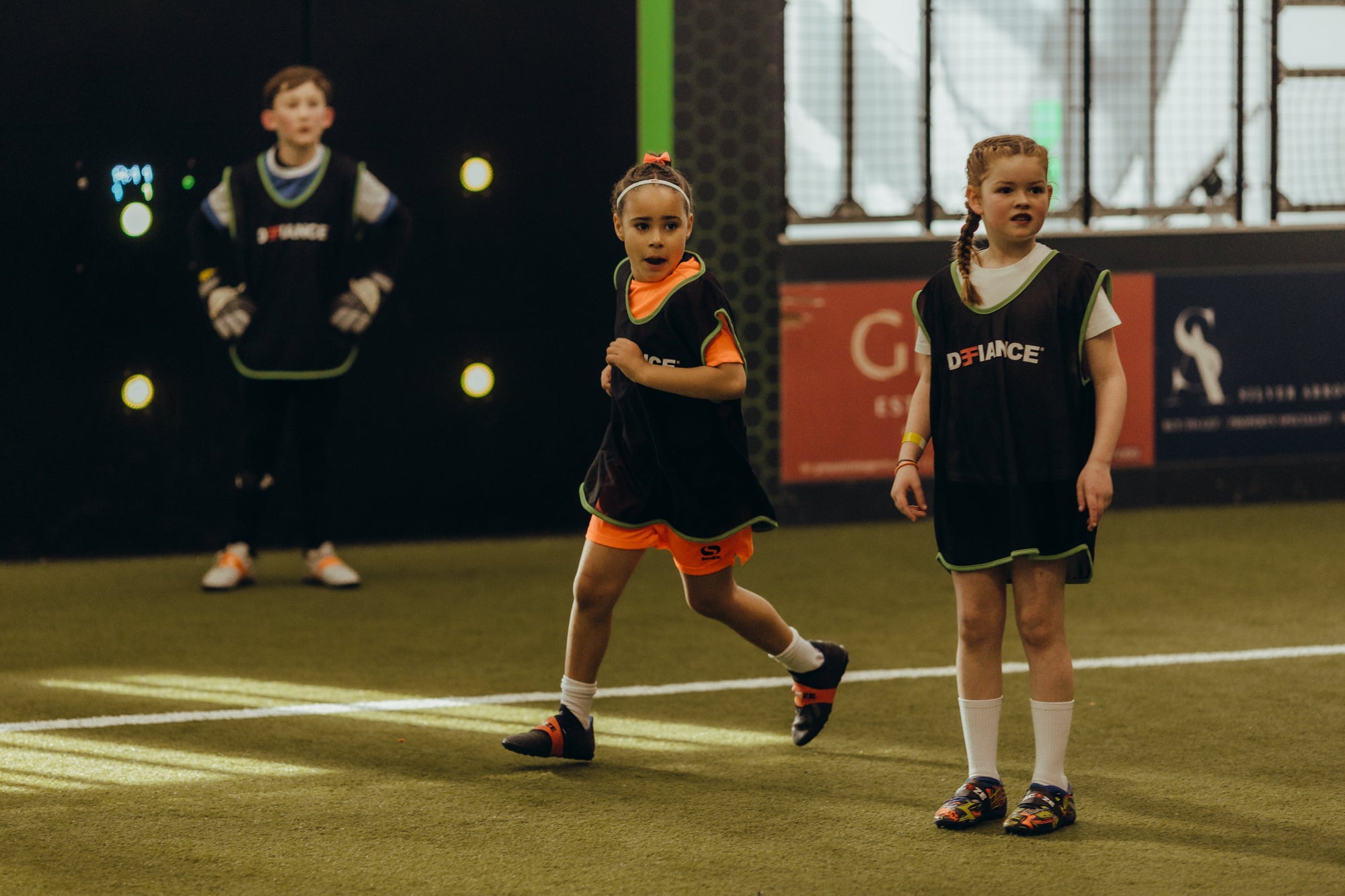How to get your child started on their football journey
As parents, we all know how much energy our kids have - and football is one of the best outlets for it. If your child has shown an interest in kicking a ball around the garden, watching the Premier League on TV, or joining in with their friends at school, you might be wondering: how do I get my child started on their football journey? The good news is, there are plenty of opportunities across the UK to get them involved - whether they’re dreaming of playing competitively or simply want to have fun with friends. I remember when my boys learnt to walk, they were soon kicking a ball around the garden but I was unsure of when, how and where to look to get them started on their football journey. This is why we’ve put together this useful advice guide for parents just starting out.
Where do I start?
This is a question we get asked a lot. The very first step is often the most daunting, but it doesn’t have to be. One of the easiest ways to get your child into football is by reaching out to your local County FA. They’ll be able to point you towards grassroots clubs and opportunities nearby. Every County FA website has a useful contacts page with a list of key personnel you can call or email. Don’t worry, they are much more approachable than you might think!
Another brilliant resource is the England Football “Find Football” portal. This tool allows you to search for local clubs, development sessions and even casual football programmes. It’s designed with parents in mind, making it straightforward to find opportunities suited to your child’s age, ability and preferences.
What types of football opportunities are available?
Not every child (or parent!!) wants to dive straight into league matches and weekend fixtures - and that’s perfectly fine. The beauty of grassroots football is that there’s something for everyone.
- Casual football: Low-commitment, fun sessions designed for children to enjoy football without the pressure of competition.
- Development programmes: Initiatives like Comets, Wildcats (for girls) and Squad offer structured but relaxed football, encouraging children to build skills in a supportive environment.
- Traditional club football: Weekly training and competitive matches for those ready to commit to a team.
- Training-only opportunities: Some clubs allow children to train without playing matches until they feel confident enough to step onto the pitch.
This flexibility is key - children can progress at their own pace without feeling rushed.
Are the coaches qualified and safe?
This is often one of the first questions parents ask - and rightly so. Every opportunity listed through the England Football portal is delivered by clubs or groups with appropriately trained coaches who hold valid DBS checks.
It’s also important to remember that grassroots football is powered almost entirely by volunteers. These mums, dads and community members dedicate hours of their time to give children a chance to play. Sometimes it may take a little longer to hear back than you’d expect from a professional after-school or academy club, but the passion and care they bring to the pitch is second to none.
What age can my child start playing matches?
If your little one is still in Reception or Year 1, you might be wondering when they can take part in real games. Under FA rules, children under the age of six are not permitted to play in competitive matches. Instead, this stage is all about fun training sessions, activities and building confidence with the ball at their feet.
Grassroots clubs often run Play Phase sessions for ages 4–6. These are game-based, child-led activities designed to spark a love of football in a safe and playful way. The focus is on enjoyment, not results – which is exactly what young children need at this age.
If your child is really young and can’t wait for these Play Phase sessions then you might be lucky enough to live near an indoor training centre such as FTY Lab. They have a Toddler session called Early Kicks for children age 18 months - 5 years with guided drills and mini games.
What if my child doesn’t want competitive football?
Not every child is motivated by goals, league tables or medals. And that’s okay! Casual football and training-only sessions provide brilliant alternatives. These options allow children to be active, make friends and develop skills without the pressure of matchdays. As a parent you don’t have to worry about paying out for expensive kits and committing to training times as many offer a pay-as-you-go option.
As parents, it’s easy to get caught up in comparing progress – but the most important thing is that our kids are enjoying themselves and feel encouraged to keep coming back.
Top tips for new parents starting out
- Be patient: Grassroots football relies on volunteers, so communication and organisation can take a little longer.
- Ask questions: Don’t be afraid to ask about training-only options or waiting list times.
- Support, don’t pressure: Let your child lead the way - whether they want to play once a week or join every session going.
- Get involved: Many parents end up helping out, from carpooling to becoming volunteer coaches themselves. Being part of the wider grassroots community can be just as rewarding for parents as it is our children. Our family have made life long friends from our own family football journey.
Why football is always worth it
We might be biased but football is more than just a sport. It teaches children teamwork, resilience and confidence. It gives them a chance to make friends outside of school and feel part of something bigger. And, as parents, there’s nothing better than watching our kids run around, smiling, with muddy knees after a good game. Anything that gets them off their screens, interacting with their peers and keeping active gets a huge tick in our book!
Whichever path you choose - casual sessions, development programmes, or full club football – the most important thing is that your child enjoys playing. Their journey doesn’t need to look like anyone else’s. What matters is that they’re active, happy and falling in love with the beautiful game.
Ready to get started? Head to the England Football Find Football tool.
_____
Frequently Asked Questions about kids’ football
Q: How old does my child need to be to start playing football in the UK?
Children can start attending fun football sessions from around age 4, often through the England Football Play Phase programme. However, under FA rules, children cannot take part in competitive matches until they are six years old. Before then, training sessions and game-based activities are the best way to build skills and confidence.
Q: How do I find a local football club for my child?
The easiest way is to use the England Football “Find Football” tool. Simply enter your postcode and filter by age, gender, or type of session. You can also contact your County FA, who can recommend local grassroots football clubs near you.
Q: What if my child doesn’t want to play competitive football?
Not all children are ready for competitive matches – and that’s okay! Many grassroots clubs offer training-only sessions or casual football opportunities such as Wildcats, Comets, or Squad programmes. These are ideal for kids who want to enjoy football without the pressure of league fixtures.
Q: Are grassroots football clubs safe for my child?
Yes. All grassroots football opportunities provided through England Football are run by trained coaches with valid DBS checks. Many sessions are organised by dedicated volunteers, so while communication may take a little longer, you can be confident your child is in a safe environment.
Q: How much commitment is needed for grassroots football?
It depends on the option you choose. Casual football sessions may run once a week with no matches, while club football usually involves a weekly training session plus a weekend match. Some clubs allow children to start with training only, building confidence before moving into games.
We hope this guide has given you some useful ideas on where to begin if you or your child are ready to take those first steps into football. We might be a little biased, but we truly believe youth football is one of the best experiences out there for kids—building confidence, friendships, and a lifelong love of the game. And if you are just starting out, it’s always worth building good habits early. One simple tip, Use Laceeze bands to keep laces secure so loose laces never interrupt play


0 comments